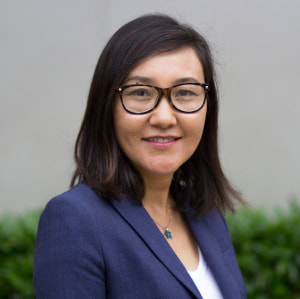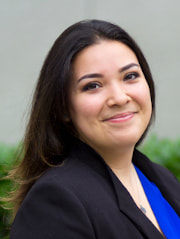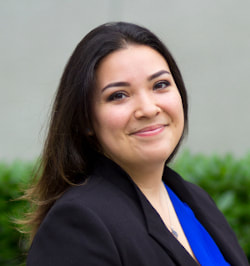“English storybook apps have the potential to be used as a language resource for children learning English as their second/foreign language,” Yang said. “This cost-effective educational technology may be particularly beneficial for those children from low socio-economic backgrounds. However, there is a dearth of research about how digital storybook apps should be designed to best support this learner population, and it is unclear how parents and children interact with each other and with the device during such bilingual story reading practices. Educators and designers need the information on how these interactions are associated with children’s English language learning outcomes in order to better inform future storybook app design.”
Yang is specializing in Teaching, Learning, and Educational Improvement (TLEI) for her doctoral work. Professor Mark Warschauer and Associate Professor Penelope Collins serve as her co-advisors.
For her doctoral work, Zhou is specializing in Educational Policy and Social Context (ESPC). Associate Professor Di Xu, Assistant Professor Rachel Baker, and Distinguished Professor Greg Duncan serve as her advisors.
Undarmaa Maamuujav awarded Chancellor’s Doctoral Incentive Program Dissertation Fellowship5/21/2021
CDIP fellowships are awarded to academically accomplished doctoral students with the goal of increasing the number of CSU faculty with the qualifications, motivation, and skills needed to teach the diverse students of the CSU system. Maamuujav will receive $5,000, faculty mentorship, and professional development and grant resources to support the timely completion of her dissertation.
After developing the materials and assessments, they will refine them with user testing and feedback from study participants.
Weaver’s research interests include learning and memory, cognitive training, music, and aging. Her current studies focus on the effects of cognitive training and experiences and lifestyle factors that support cognitive health with aging. Weaver, who received a 2019 National Science Foundation Graduate Research Fellowship in support of her doctoral work is specializing in Human Development in Context. She was also recently awarded with the Center for the Neurobiology of Learning and Memory (CNLM) Jared M. Roberts Memorial Graduate Student Award for her project entitled "Keeping the mind sharp is music to my ears." Jaeggi, who serves as Weaver’s advisor, researches training and transfer, individual differences in working memory capacity and executive control, as well as the nature of working memory limitations across the lifespan. She directs UCI's Working Memory and Plasticity Lab (WMP). Jaeggi is a CNLM fellow and holds a courtesy appointment in the Department of Cognitive Sciences in UCI's School of Social Sciences. About the SSIHI: The Susan Samueli Integrative Health Institute (SSIHI) Pilot Studies Awards are designed to support exceptionally innovative research projects that provide an understanding of the mechanistic basis or clinical outcomes related to integrative health therapies. This program encourages early exploration of research ideas from UCI and UCI-affiliated faculty members which have the potential to create or contribute to the evidence base of integrative health.
She currently is serving as a 2021 Public Impact Distinguished Fellow, one of four graduate students at UCI to receive the 2021 honor. As part of her research, she is developing, implementing, and evaluating a curriculum that is being integrated into elementary schools across Santa Ana Unified School District as well as in San Francisco Unified and Chicago Public Schools. Professor Mark Warschauer serves as her advisor.
In an effort to help faculty, students and staff remain connected and engaged with one another while working and studying remotely, the UCI School of Education Climate Council in summer 2020 launched the Advancing Ideas initiative.
The initiative invited School of Education employees and students to submit proposals for advancing equity and inclusion. After receiving and reviewing proposals, three programs were ultimately funded and held: Food for Thought, CFEP Book Club, and the Undergraduate Student Support Hub Mentorship Program. Food for Thought created a friendly, casual, and safe space for School of Education members to experiment with cooking, share recipes while learning about each other’s diverse experiences and perspectives, and discuss issues of equity and inclusion. (Read about Food for Thought here.) In the CFEP Book Club, School of Education and Center for Educational Partnership staff and Climate Council members formed a reading group to explore seven different anti-racist publications. The club provided an inclusive community space that encouraged intentional reflection and discussion of the material. During discussions, readers had opportunities to share their engagement with and reflections on the work, personal narratives, and desires to act on what they learned from the readings and discussions. CFEP Book Club selections were:
“It’s hard to read and discuss these books and realize that your own inaction allows the injustices faced by Black people, that you are complicit,” said Patricia Anderson, assistant director, CFEP. “The book club raised a consciousness among us of our moral imperative to do more.” “The CFEP book club is a space where participants explore, discuss, and reflect on literature that amplifies systemic inequities that continue to plague marginalized communities in general, and the Black community in particular,” said Pheather Harris, director of the UCI California Alliance for Minority Participation. “Understanding the historical context concerning the social construct of race in this country, and the ways in which it works to produce disparate outcomes in varying environments, is a necessary step to gaining a deeper understanding about our proximity to racism and, more importantly, how to dismantle systemic oppression.” The Undergraduate Student Support Hub Mentorship Program - designed by doctoral students Socorro Cambero, Ashley Harlow, Alissa Wolters, and undergraduate student Kevin Si, and facilitated by CFEP Dream Project Fellow Vanessa Rivera Hernandez - engaged graduate students as mentors for three to four undergraduate mentees each. The intent of the program was to provide one-on-one mentorship to incoming freshman, transfer and continuing undergraduate students within the School of Education. Furthermore, the program aimed to assist students in developing skill sets to foster academic success. “As a first-generation student, I experienced navigating the world of higher education on my own, and graduate student mentors were huge sources of inspiration and advice for me,” said mentor Valery Vigil, first-year doctoral student. “I'm thankful for an opportunity to give back and mentor students in the SOE community!” During winter and spring quarters mentors met with their mentees individually, then participated in four bi-weekly socials per quarter where mentors shared resources, answered questions, and promoted the benefits of graduate study. Mentors spent an average of 23 hours per quarter meeting individually with their mentees and organizing and attending socials. “Mentoring for the USSH has been great,” said mentor John Szura, third-year doctoral student. “Biweekly kickback sessions each quarter provide the group with a great way to connect, have fun, and share information about college. Meeting with my mentees has been so valuable as we've connected over the past two quarters to chat about post-graduation options, graduate life, and successful progression during the quarter.” Mentees reported that the consistent check-ins with their mentor were helpful for their reflection and growth. A second Advancing Ideas initiative is scheduled for 2021-2022. “I think this year’s initiative helped to build trust so that we could start to talk with each other in ways that are productive and that can lead to change,” said Elizabeth Peña, professor, associate dean of faculty development and diversity and co-chair of the School of Education Climate Council. “Our intention is that these smaller efforts grow into sustained actions.”
The project will build on a previous study Penner conducted. In it, Penner and her collaborator found that enrollment in a ninth-grade ethnic studies class substantially increased attendance, grade point averages, and course credits for students who were labeled at-risk of dropping out of high school based on eighth grade performance. (Read more here.)
Penner’s work will involve collaborations across three existing research-practice partnership teams formed by faculty from multiple universities, K-12 administrators and educators, and graduate students who are examining ethnic studies scale-up efforts across three districts. “This work is really rooted in collective efforts to better understand where and how ethnic studies boosts students’ outcomes so that we can understand how to successfully scale-up these programs.” “This is an incredible honor for an early-career researcher,” said Richard Arum, dean and professor, UCI School of Education. “Professor Penner is leading innovative research into this critically important field, and we look forward to the critical insights that her research will generate on this topic.” Penner will begin this research by synthesizing current approaches to ethnic studies teaching and mentoring practices. In the later stage of the grant, she will observe ethnic studies classrooms and conduct interviews with teachers in several districts to better understand core aspects of effective practices. Linking these data to administrative records, Penner will examine how the observed teaching practices predict student outcomes. Finally, using data from interviews with district leaders and teachers, as well as observations of ethnic studies professional development activities, Penner will investigate how school districts can recruit and train new ethnic studies teachers to use these practices. “There have been a number of recent collaborative efforts to formalize and share ethnic studies curricula and pedagogy to support district efforts to expand their ethnic studies course offerings,” Penner said. “It’s going to be really exciting to see how teachers are enacting these resources in their classrooms and how they’re engaging students through that work.” Penner intends that her research will provide an understanding of teaching techniques that support learning and student success. Furthermore, she hopes this understanding will result in policies, tools, and training for K-12 educators that can be communicated nationally. Several states have developed ethnic studies curricula and expanded course offerings for K-12 students, including California, Indiana, Nevada, Oregon, Texas, Washington, and the District of Columbia. This rapid expansion has important implications for teacher education programs. “While K-12 ethnic studies offerings are expanding, we do not have a robust pipeline for recruiting and training teachers prepared to include ethnic studies in their classrooms. As districts are finding new teachers to become trained in this field, they need models and best practices of professional development to emulate. We also need more research about those training efforts.” “Our ultimate goal in all of these efforts is to learn from and support ethnic studies teachers in ways that foster engaging, critical, and caring experiences for all of their students,” Penner said. “I very much appreciate the honor and the research funding awarded to me by the William T. Grant Foundation to advance my research in this socially critical and time-sensitive area.” Launched in 1982, the William T. Grant Scholars Program supports the professional development of promising researchers in the social, behavioral, and health sciences who have received their terminal degrees within the past seven years. To date, the program has sponsored more than 197 researchers. Penner is the first School of Education professor to be named a William T. Grant Scholar while at UCI. In 2007, while at the Arizona State University, the William T. Grant Foundation named current School of Education Professor Sandra Simpkins one of its Scholars.
Weaver will be honored at the 2021 CNLM virtual awards ceremony on May 18 (register here). She will present her research and receive a $1,000 stipend to support her attending the annual Neurobiology of Learning and Memory Meeting at Park City, Utah on May 27-28, where she will again present her research.
Weaver is specializing in Human Development in Context (HDiC) and is advised by Professor Susanne Jaeggi. The Jared M. Roberts Memorial Award was established in 2017 by the family, friends and colleagues to honor former CNLM graduate student Jared Roberts (read more here).
“There is a dearth of research that focuses on the linguistic features of adolescent L2 [second language] students’ analytical and academic writing,” Maamuujav said. “Identifying the needs of these language-minority students and understanding the challenges they encounter when engaging in academic and school-based writing is necessary to better serve these students and help them access college.”
Maamuujav’s doctoral research foci include writing and rhetoric, critical reading, genre analysis, academic writing, composition, second language writing and acquisition, and technology in writing and literacy development. She earned her B.A. in English and Education and her M.A. in Linguistics at University of the Humanities in Mongolia, and her M.A. in Teaching English to Speakers of Other Languages (TESOL) at California State University, Los Angeles (CSULA). Prior to joining UCI’s doctoral program, she taught English and writing courses for 13 years. “My experience of teaching, along with being a first-generation college student, English learner, and an international resident from Mongolia, has given me an appreciation of the commitment that Minority Serving Institutions, such as UCI, are making to advance equity, promote inclusion, and recognize diversity as an asset,” Maamuujav said. “The goal of my study is in alignment with UCI's Inclusive Excellence Action Plan ‘to facilitate access’ and ‘to educate and employ for diversity’.” Maamuujav is specializing in Teaching, Learning, and Educational Improvement (TLEI) for her doctoral work. Professor Emerita Carol Booth Olson serves as her advisor.
Jacob’s research interests are interdisciplinary, bringing theory from the learning sciences, computer science education, and applied linguistics to study the teaching and learning of computing and computational thinking to multilingual students. Prior to her doctoral work, she taught high school English as a Second Language for four years to multilingual students, including at a New Arrivals Center where she taught sheltered math and science to newcomers. As part of her research, Jacob is developing, implementing, and evaluating a computer curriculum that is being integrated into elementary schools across Santa Ana Unified School District as well as in San Francisco Unified and Chicago Public Schools.
Jacob currently is a UCI 2021 Public Impact Distinguished Fellow, one of four graduate students university-wide to receive the honor. She is specializing in Language, Literacy, and Technology for her doctoral work. Professor Mark Warschauer serves as her advisor. Eight doctoral students across southern California received a 2021 Haynes Lindley Doctoral Dissertation Fellowship award. Three of the awardees are UCI students – Jacob (Education), Nathan Mahaffey (Social Ecology), and Steven Schmidt (Social Science). Read more about the John Randolph Haynes and Dora Haynes Foundation here. |
Resources for:
|
|










